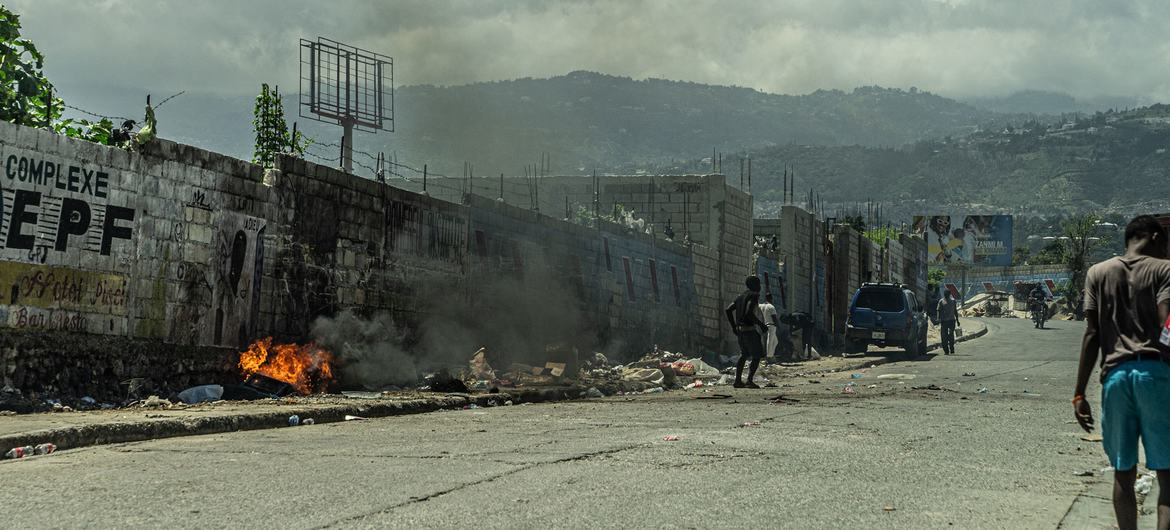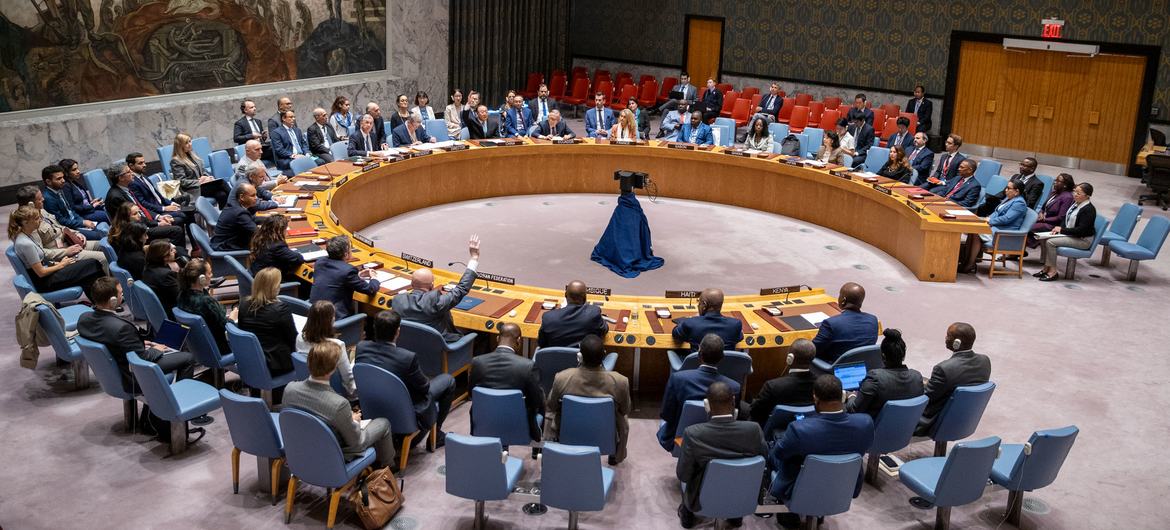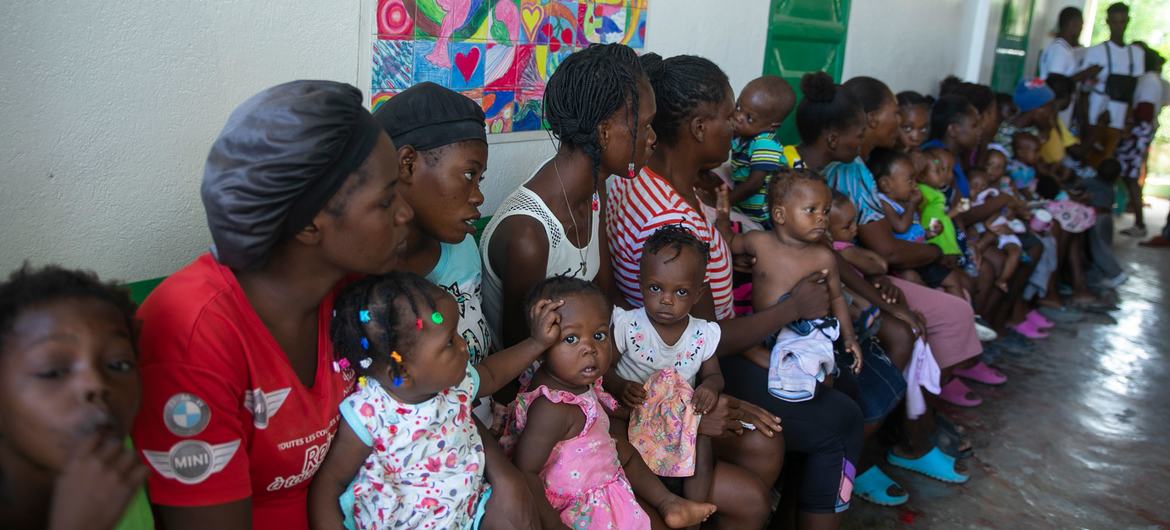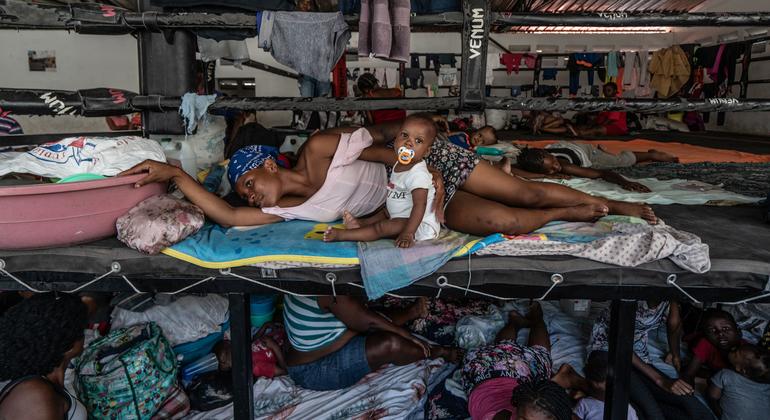1. The context: Lawlessness and fear
While the situation in Haiti has long been characterized by lawlessness, with powerful gangs controlling much of the capital, Port-au-Prince, the months of January and February 2024 have been the most violent in the last two years, with over 2,500 people killed, kidnapped or injured since the start of the year. The decision of Prime Minister Ariel Henry, in March 2024, to step down has further complicated the situation.
On 21 March, Ulrika Richardson, the UN Humanitarian Coordinator in Haiti, warned that the violence is now spilling out into new areas of the capital, including formerly peaceful suburbs, following weeks of orchestrated gang attacks on prisons, ports, and hospitals. Ms. Richardson said that human rights violations are widespread; sexual violence, with the use of torture and “collective rape” against women, is rampant, she said.
The senior UN official described a growing humanitarian crisis, with over 362 000 internally displaced persons, a lack of clean water and less than half of health facilities in Port-au-Prince functioning at normal capacity.
Hunger has reached unprecedented levels, according to a new assessment released on 22 March and backed by the UN. According to the report, 4.97 million people face crisis or worse levels of acute food insecurity, including 1.64 million people facing “emergency” levels.
More and more people are attempting to leave the capital, risking passing through routes controlled by gangs. At least thirty-three thousand left to find refuge in the provinces in March, most of them heading to the Grand Sud departments, a region that already hosts more than 116,000 displaced persons.

Fires burn on streets in the Cité Soleil area of Port-au-Prince.
2. The humanitarian response: Delivering under fire
Since the beginning of the latest crisis, marked by a series of coordinated gang attacks at the end of February across Port-au-Prince that led to a state of emergency and the eventual resignation of Prime Minister Henry, UN workers have continued to distribute aid to the civilian population despite the hazardous security conditions.
The World Food Programme (WFP) has distributed some 160,000 hot meals, while the World Health Organization (WHO) has delivered a range of essential health supplies, and planes from the UN Humanitarian Air Service (UNHAS) have flown in around 800kg of blood pouches.
The UN, along with partners, has been trying to address the lack of access to clean water: for example, between 16-18 March UNICEF and the NGO Solidarités International delivered 20,500 gallons of water to four sites that are home to over 12,000 displaced people while between 17 and 20 March, the UN migration agency IOM delivered 16,000 gallons of water to two sites.
Support from the UN reproductive health agency, UNFPA, and partner NGOs is being provided to victims of gender-based violence, in the form of a hotline providing psychosocial assistance, and a sexual and reproductive health/sexual and gender-based violence mobile clinic in one of the sites for internally displaced persons.

The Security Council adopts a resolution authorizing the creation of a Multinational Security Support (MSS) mission in Haiti in October 2023.
3. The multilateral response
Finding a way to end the Haitian crisis has been the subject of several high-level UN meetings. On 21 March the Security Council, the UN organ charged with maintaining international peace and security, issued a press statement reiterating its members support for a “Haitian-led, Haitian-owned political process”, and stressed the need for the international community to redouble its efforts to provide humanitarian assistance to the population and to support the Haitian National Police. The members of the Security Council also expressed grave concern at the illicit flow of arms and ammunition into Haiti that remains, they said, a fundamental factor of instability and violence.
Back in October 2023, the Security Council authorized the deployment of a multinational security support (MSS) mission to Haiti at the request of the then government. The resolution was hailed at the time as a historic first, although the mission has yet to be deployed.
4. Funding: A massive gap to fill
In the meantime, several senior officials from the UN System continue to call for a significant uptick in funding for the humanitarian effort.
On Thursday, Ms. Richardson noted that the humanitarian response plan for Haiti, which requires $674 million, is only six per cent funded. “Time is running out,” she said.
Earlier in March, Cindy McCain, the head of the World Food Programme, warned that the aid effort was “running on fumes”.

Women and their children wait at a UNICEF-supported mobile clinic in Port-au-Prince, Haiti. (file)
5. An uncertain future
The MSS mission to bolster the understaffed and under resourced Haitian National Police is expected to be led by Kenya, with troops also promised by several Caribbean countries. The US has pledged some $300 million, according to media reports.
Although this is not a UN mission, it has been authorized by a Security Council resolution.
However, while there is widespread agreement that Haiti urgently needs help to bring about a secure and stable environment, the mission was thrown into disarray by Mr. Henry’s resignation, which prompted Kenya to announce that it would delay the deployment until the announcement of a new Haitian government.
According to media reports, political groups are close to agreeing on a transitional council that would take over presidential powers until elections can be held. It is unclear if and when the council will take power or when the security mission will begin operating on Haitian soil.



